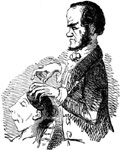
The Cardinal Who Would Be a Saint Needs Not Only a Halo, but a Backbone
IN THE CULTURE OF DEATH
When should one violate the Golden Rule? When is the beatitude about peacemakers superseded by Christ’s saying that He came not to bring peace but the sword? When is one required to drive the money changers from the temple? When should one curse the fig tree? Is it an act of charity to spare a wrongdoer public embarrassment? These are very difficult questions, and ones which the late, beloved Joseph Cardinal Bernardin never satisfactorily resolved.
Cardinal Bernardin, by virtue of his crosses — the slanderous accusation by a former seminarian that he was sexually abused by Bernardin years ago, and his highly publicized death from cancer — became the most visible Catholic prelate in America in recent years. He was, moreover, recognized far earlier by the national news media, and hence the public, as the great conciliator in the American hierarchy, trying to weave anti-capital punishment liberals and prolife conservatives with anti-nuclear arms activists into his “Seamless Garment.” More recently, he attempted to reconcile orthodox and dissenting Catholics in his “Common Ground” initiative. These attempts have been controversial and largely unsuccessful, yet they provided Bernardin with an avenue to the American media that forced them to pay attention and to suspend at least somewhat their typically condescending and superficial treatment of Catholicism. But shortly before his death, Cardinal Bernardin chose to forego an opportunity that could have immeasurably exploited — and enhanced — his position of prominence in a cause he fervently championed — the sanctity of human life.
In the autumn of 1996, President Clinton presented Cardinal Bernardin with the Medal of Freedom, the nation’s highest civilian award. The president well knew the cardinal’s popularity, and that he was dying. And it is by no means the height of cynicism to observe that it was also the autumn of a presidential election year and that the so-called Catholic vote was up for grabs. Earlier that year the president had vetoed congressional legislation prohibiting partial-birth abortions, a veto vehemently opposed by the Catholic hierarchy. The cardinal accepted the Medal, but, shortly afterward, he joined several fellow American cardinals and bishops in a cold, autumn rainstorm vigil protesting the president’s actions and attempting unsuccessfully to persuade Congress, especially the Senate, to override the veto. Bernardin’s seemingly contradictory action of acquiescence and protest was critically noted; his purported response was that the Medal came from the American people, not from President Clinton. It was a response that betrayed astonishing naïveté in the ways of Washington (this writer, in his service to the federal judiciary, worked with the White House several years ago on the awarding of the Medabpor that sort of misplaced charity which is unwilling to embarrass publicly a public official — or both. Bernardin’s decision to accept the Medal of Freedom from the hand that effectively signed a death warrant for certain children all but technically already born was nothing less than tragic. His refusal to take an unequivocal action that would have surpassed his many words in favor of life was an opportunity lost — in his case, for all time.
If Bernardin had refused to accept the Medal of Freedom, on the basis of Clinton’s partial-birth abortion veto, the cardinal could have matched the roar of Thomas More’s silence in the face of Henry VIII’s marriage to Anne Boleyn. It could have riveted the attention of the nation to an issue it would prefer to ignore and forget. It could have reinvigorated a dispirited prolife movement. Not the least, it could have forced the most notoriously unreflective careerist president in memory to think about what he had done. The cardinal’s refusal could have advanced a raison d’être for the priesthood itself. assisting individuals — in this case, Bill Clinton — in saving their souls. And the effect would have been all the more powerful because of the cardinal’s gentle, universally admired character.
You May Also Enjoy
Bishop Wife-Beaters... Blow-Away Church... No More Priestly Piggybacks... Miniskirt Protestors... Upstanding, Even After Death... Boogers Aplenty... Mirror Worship... Double Double... 'Come and Get Some!'
Method of Inclusivity... Undergraduate Hitman... Rat Town, Down Under... Trash Champs... A Fitting Accommodation?... Wondrous Words... more
Reviews of Go to Joseph...The Dan Clay Trilogy: A World Away...

